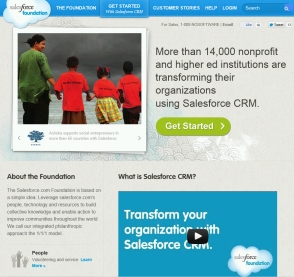 Once upon a time Salesforce was little known in the nonprofit world. It was primarily used as a customer relationship management tool by businesses. Now according to the Salesforce Foundation website, “more than 14,000 nonprofit and higher educational institutions are transforming their organizations using Salesforce CRM.” The foundation calls its “integrated philanthropic approach the 1/1/1 model, which leverages salesforce.com’s people, technology and resources to build collective knowledge and enable action to improve communities throughout the world.”
Once upon a time Salesforce was little known in the nonprofit world. It was primarily used as a customer relationship management tool by businesses. Now according to the Salesforce Foundation website, “more than 14,000 nonprofit and higher educational institutions are transforming their organizations using Salesforce CRM.” The foundation calls its “integrated philanthropic approach the 1/1/1 model, which leverages salesforce.com’s people, technology and resources to build collective knowledge and enable action to improve communities throughout the world.”
Nonprofits are eligible to receive 10 free Enterprise Edition licenses, which makes it especially attractive for small nonprofits. The Salesforce for Nonprofits site explains how nonprofits can use it for managing relationships with constituents, team collaboration, and donation and grants management. It’s free and easy for nonprofits to get started, but the real cost is in customization of Salesforce for the specific needs of the particular organization. That’s where we come in.
Raymond Hearn, Senior Consultant at Community IT Innovators (CITI), explains, “We specialize in helping nonprofits implement Salesforce as one aspect of a strategic relationship with their IT service provider. That relationship often encompasses comprehensive IT planning, outsourced CIO, software selection, and network infrastructure support. In the course of delivering this broad range of services we get to know our clients inside out. And when Salesforce is a good fit for their needs, we put that knowledge to work to implement a system that fits their organization’s business processes.”
One example of this type of relationship is Hearn’s work with longtime CITI client Ayuda, an organization that protects the rights of low-income immigrants in the DC metropolitan area. He helped them shift from managing their data in spreadsheets to managing their data in Salesforce.
Irfana Anwer, Ayuda’s Director of Community Legal Interpreter Bank, explains, “We had the choice of either buying a database or migrating to Salesforce. Since there is no monthly fee or annual fee, it was a cost effective way for us to go. We got the free Salesforce licenses for nonprofits. CITI helped us to migrate data we were storing in excel spreadsheets to Salesforce. They also helped us to customize Salesforce, so it feels like it was made for us. Raymond Hearn also trained our staff on how we can use Salesforce. It has also been a great resource in terms of generating reports for funders.”
If your organization is thinking about migrating to Salesforce, feel free to contact us at (202) 449-6714 or email me at rkothari[at]citidc.com to schedule a meeting to discuss how we may be able to help you.
